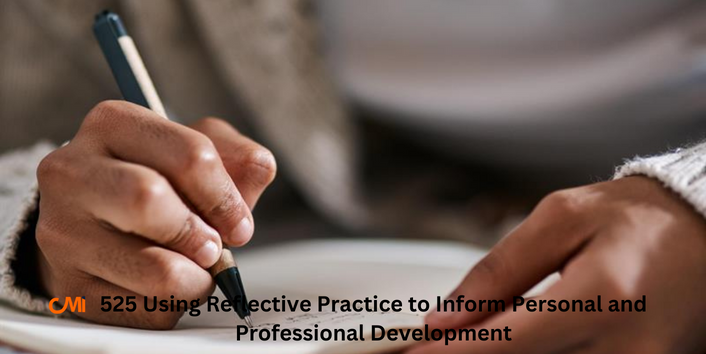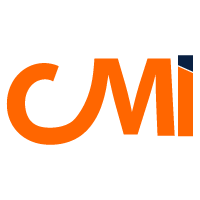CMI 525 Using Reflective Practice to Inform Personal and Professional Development
- February 17, 2023
- Posted by: Scarlett
- Category: CMI Level 5

Table of Contents
CMI 525 Using Reflective Practice to Inform Personal and Professional Development is a unit that focuses on using reflective practice as a personal and professional development tool. Reflective practice is a process that involves thinking about one’s experiences, actions, and behaviours and then evaluating them to gain insights and improve performance. This unit is designed to help learners develop a deeper understanding of reflective practice and how it can enhance their personal and professional development. The unit covers various topics related to reflective practice, including its benefits, the different models of reflective practice, and the multiple techniques that can be used to reflect on one’s experiences. Learners will also be introduced to the concept of personal and professional development and will learn how reflective practice can be used to identify areas for growth and development. Through this unit, learners will develop the skills and knowledge necessary to reflect on their experiences and use these reflections to inform their personal and professional development. They will be able to identify areas for improvement, set goals for themselves, and develop strategies for achieving them. Overall, this unit aims to equip learners with the tools and techniques they need to reflect on their experiences and use these reflections to enhance their personal and professional performance.
Aims of unit
The CMI 525 Using Reflective Practice to Inform Personal and Professional Development unit emphasises the significance of reflective practice as an essential management tool. By critically evaluating one’s performance, decision-making, leadership, and management skills in different situational contexts, managers can identify areas for ongoing development. The unit aims to equip learners with an understanding of the value of reflective practice and how it can be used as a basis for meaningful personal and professional development. In addition, the unit allows learners to explore different reflective models and techniques and evaluate their usefulness in improving performance and promoting growth. Reflective practice allows managers to take a step back and assess their actions and decisions, evaluate their effectiveness, and identify areas for improvement. By engaging in reflective practice, managers can gain a deeper understanding of their strengths and weaknesses, increase their self-awareness, and enhance their professional capabilities. Moreover, the unit will highlight the importance of feedback in reflective practice and how it can be used to facilitate personal and professional growth. Managers will learn how to receive and give feedback constructively and use it to inform their reflective practice and drive continuous improvement. In summary, the CMI 525 Using Reflective Practice to Inform Personal and Professional Development unit provides managers with the knowledge and skills necessary to engage in reflective practice and use it to enhance their personal and professional development. The unit is crucial to any manager’s professional development, enabling them to build their capacity for self-reflection, continuous learning, and growth.
What you’ll learn
The CMI 525 Using Reflective Practice to Inform Personal and Professional Development unit aims to equip learners with the following knowledge and skills:
- Understand the principles and value of reflective practice in personal and professional development.
- Identify the factors that influence personal and professional development and performance.
- Critically evaluate own performance, decision-making, leadership, and management skills.
- Explore different models and techniques of reflective practice and evaluate their effectiveness in improving performance and promoting growth.
- Identify and reflect on the impact of personal and professional development on others.
- Use feedback constructively to facilitate personal and professional growth.
- Plan and implement a personal and professional development plan based on reflective practice.
- Recognize the importance of ongoing reflective practice in driving continuous improvement and professional growth.
Through the CMI 525 unit, learners will understand the principles and practices of reflective practice and how to use them to inform personal and professional development. The skills and knowledge acquired in this unit will enable learners to become more self-aware, develop their strengths and weaknesses, and enhance their capabilities as managers and leaders.
What are the possible outcomes?
The outcomes of studying CMI 525 are numerous and can include the following:
- Understand the value of reflective practice to inform personal and professional development.
- Know how to apply reflective practice to inform personal and professional development.
How can we help?
CMI Assignment Help can provide valuable assistance to students looking to complete their CMI 525 Using Reflective Practice to Inform Personal and Professional Development assignments. Here are a few ways in which CMI Assignment Help can be helpful:
- Clarifying assignment requirements: CMI Assignment Help experts are familiar with the CMI 525 unit and can help students understand the assignment requirements, including the format, structure, and content of the assignment.
- Guiding reflective practice: The CMI 525 unit focuses on reflective practice, which can be challenging for some students. CMI Assignment Help experts can guide how to approach reflective practice and offer examples of effective reflective writing.
- Offering feedback and suggestions: CMI Assignment Help experts can review a student’s work and provide constructive feedback and suggestions for improvement, helping the student to refine their work and achieve a higher grade.
- Saving time: Students often have a lot of other work to complete, and finding time to devote to a single assignment can be challenging. CMI Assignment Help can take some of the workloads of the student by providing high-quality, custom-written assignments within the specified deadline.
- Ensuring high-quality work: CMI Assignment Help experts are knowledgeable and experienced in the field, ensuring that students receive high-quality assignments that meet the required standards and guidelines.
Overall, CMI Assignment Help can be an invaluable resource for students who can confidently complete their CMI 525 assignment and achieve their academic goals.
Resources
- Belbin (1981) Team Roles
- Berne (c.1950) Transactional Analysis
- Gibbs (1995) The Reflective Cycle
- Goleman (1995) Emotional Intelligence
- Johns (1994) Model of Structured Reflection
- Kasozi and Dehaan, 2014 Drivers
- Kolb (1984) The Learning Cycle
- Lyons (2015) Mental Toughness
- Margerison and McCann (1990) Team Management Wheel
- McIntyre (2011) Co-worker relationships
- Mullins (2013)
- Myers Briggs (1943) Type Indicator
- Pedler, Burgoyne, Boydell (2007)
- Schön (1987) The Reflective Practitioner
- Tate (2014) DISC
- Torrington et al. (2008)
Resources
FAQ
What is CMI 525, and what is its primary focus?
CMI 525 is a course that centers around using reflective practice to inform personal and professional development. The course explores the concept of reflective practice, which involves looking back on past experiences, actions, and decisions to gain insights and learn from them. The primary focus is on using reflection as a tool for continuous improvement and growth in both personal and professional contexts.
Why is reflective practice important for personal and professional development?
Reflective practice is essential for personal and professional development because it enables individuals to learn from their experiences, identify strengths and areas for improvement, and make informed decisions based on past lessons. By engaging in reflective thinking, individuals can enhance self-awareness, critical thinking skills, and emotional intelligence, leading to improved performance and decision-making in their personal and professional lives.
How is reflective practice typically applied in personal and professional contexts?
Reflective practice is applied through a structured process of self-reflection. Individuals may keep reflective journals or engage in guided discussions or exercises to analyze their thoughts, emotions, actions, and outcomes related to specific experiences or challenges. They then use this analysis to identify patterns, assess their performance, and set goals for future development.
What are some techniques for effective reflective practice covered in CMI 525?
CMI 525 may cover various techniques for effective reflective practice, such as Gibbs’ Reflective Cycle, Kolb’s Experiential Learning Theory, and the S.T.A.R. (Situation, Task, Action, Result) method. These techniques provide frameworks for organizing reflections and extracting meaningful insights from experiences.
How can reflective practice benefit individuals in their professional careers?
Reflective practice can benefit individuals in their professional careers by helping them become more effective and efficient in their roles. By reflecting on their experiences, professionals can identify areas where they excel and areas where they can improve. This process can lead to enhanced job performance, better decision-making, increased adaptability to change, and a more proactive approach to professional development.
Can reflective practice be applied in team settings or organizational contexts?
Yes, reflective practice can be applied in team settings and organizational contexts. Team members can engage in collective reflection to assess team dynamics, communication, and collaboration. In organizations, reflective practices can be integrated into performance evaluations, training programs, and knowledge-sharing initiatives to foster a culture of continuous learning and improvement.
Why Choose Us?
- GPT Zero
- 100% Non-plagiarised Papers
- Dedicated human resource writers
- 24/7 /365 Service Available
- Affordable Prices
- Money-back and Privacy guarantees
- Unlimited Amendments upon request
- Satisfaction guarantee
